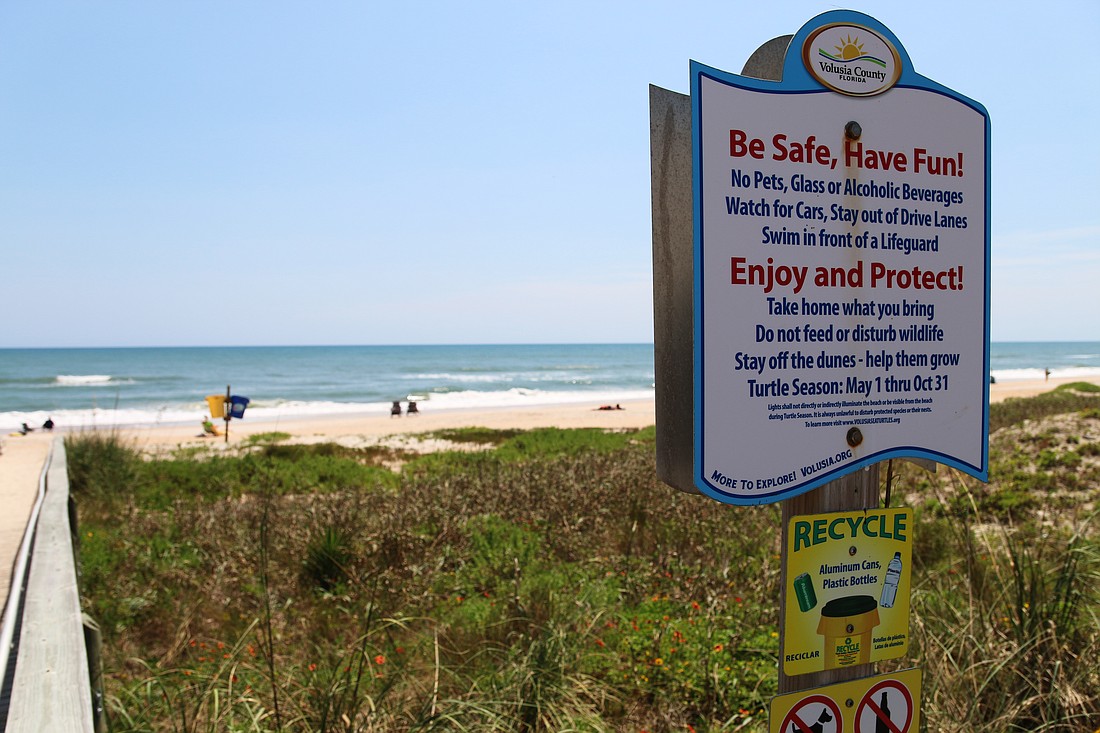- April 5, 2025
Your free article limit has been reached this month.
Subscribe now for unlimited digital access to our award-winning local news.

While the Volusia County Council has opted out of implementing beach toll fee changes, it is considering adding fees for off-beach parking for nonresidents in the near future.
The council voted 6-1 at its meeting on Tuesday, March 21, to direct staff to explore how to implement such a fee, with Council Chair Jeff Brower voting against.
“I would like to see the toll booths go away, and not charge out-of-towners, in-towners, anybody to go to the beach,” Brower said. “We pay for the beach, the locals, in their property taxes.”
Volusia County charges $20 for a daily pass to drive on the beach, for both residents and nonresidents. Residents can buy an annual beach pass for $25. Or they can buy one $20 daily pass, then, the next time they go to drive on the beach, show the $20 receipt and pay the additional $5 that would be due for an annual pass. An annual pass for nonresidents costs $100. People with a disabled license plate or placard can receive a complimentary annual or daily pass.
The council was reluctant to make any changes to the fees, which accounted for over $8 million in revenue in the 2021-2022 fiscal year. The majority of the money — $5.38 million — came from daily passes.
To meet a charter requirement mandating that beach toll fees to be “uniform and reasonable,” the county uses general fund money to buy down the cost difference between residential and nonresidential annual passes.
State law also requires beach toll fees to be “reasonable,” according to the county.
“I think we’re headed in the right direction by calculating if we can get the net and gross of some of the parking and try ... maybe calculate and look at [beach tolls] in the future,” Councilman Danny Robins said.
Councilman Troy Kent proposed having nonresidents pay for off-beach parking, using New Smyrna Beach as an example. New Smyrna charges nonresidents to park at one of its five beachfront lots, and Kent said the city reported $1.3 million in revenues from those fees in 2022.
New Smyrna has 452 parking spaces. Volusia County has about 2,100 off-beach parking spots.
Based on the revenue generated per parking spot in New Smyrna, Kent calculated that the county could make about $6.4 million a year if it began charging nonresidents to park in off-beach lots.
That money, he said, would outweigh the $1.4 million the county expects to receive this year from annual resident beach pass sales, so adding a fee for nonresidents could allow the county to drop its annual fee for residents.
“The general fund is already paying for our beach, and that is taxpayer money,” Kent said. “So charging Volusia residents to drive on their beach is making them pay twice.”
Kent also proposed raising the cost of daily passes to $30 and annual passes for non-residents to $150.
Councilman Matt Reinhart said that while New Smyrna Beach has parking kiosks for fees, the city also has “parking ambassadors” for enforcement. Enforcing off-beach parking could further burden law enforcement, he said.
“They do have an enforcement issue, which is something we’d have to discuss with beach protection,” Reinhart said.
Staff members said there are other options for charging fees, such as an app — an option Reinhart said he favored.
Robins wasn’t ready to eliminate beach toll fees for residents because he felt the cost would fall on taxpayers, but he supported Kent’s initiative to get “more of a neutral ground.”
Councilman Don Dempsey said that the taxpayers who use the beach are the ones who should be paying for it.
“There’s so many taxpayers who don’t use the beach, but yet, they’re paying taxes,” he said. “We’re coming up on the budget, and I’m more concerned about not having to raise taxes, and even lowering taxes, than I am worried about people driving on the beach for free when the people who don’t even use the beach are not going to get the benefit of the tax deduction.”
A vote to keep the beach tolls unchanged passed in a 4-3 vote with Kent, Dempsey and Brower voting against.
Brower said he was prepared to support Kent’s original proposal, as it would increase general fund revenue. But he said he would vote against exploring charging nonresidents to park in off-beach lots because he believed the beach should be free for all. Brower was interrupted by Robins, who called for a point of order. When Brower challenged the validity of the point of order, Robins made a motion to limit debate.
The motion to limit debate passed 4-3, with Dempsey, Kent and Brower voting against.
“My goal is to grow Volusia County, and I think if we have a wide, open beach, we get more sales tax,” he said. “There’s plenty of ways as it has just been demonstrated that we could pay for the beach.”
Your free article limit has been reached this month.
Subscribe now for unlimited digital access to our award-winning local news.